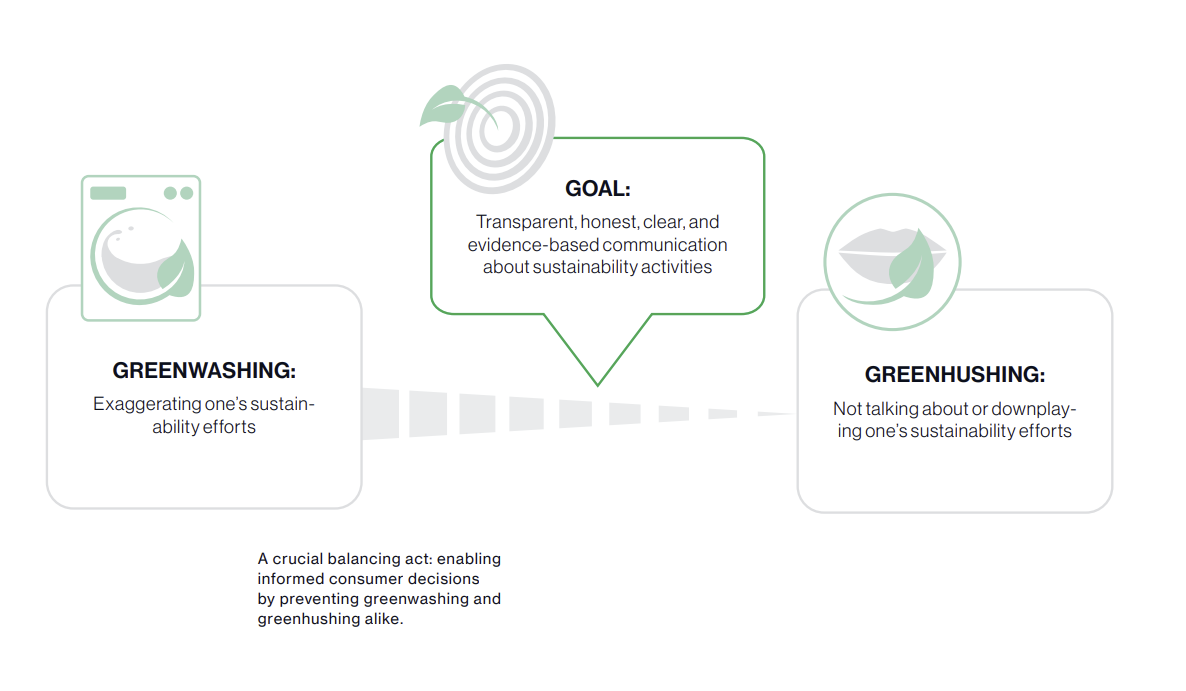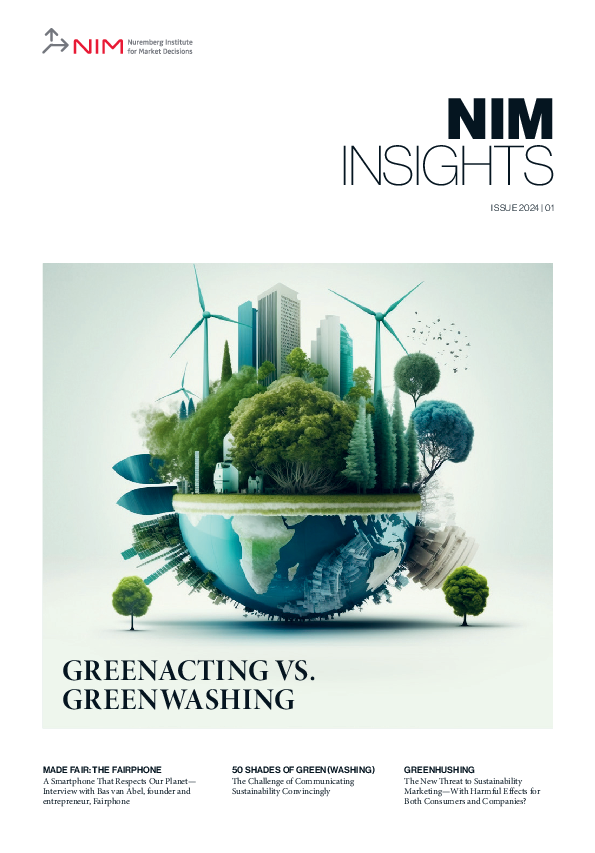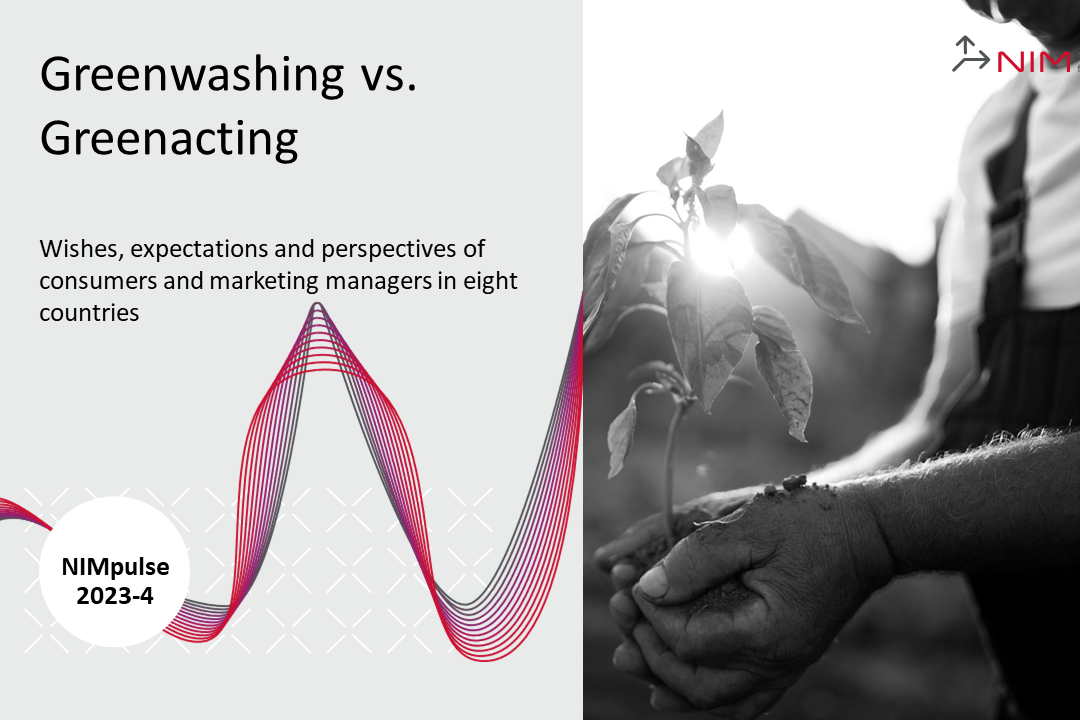Publikationen
2024
Nina Hesel
Greenhushing
Greenhushing, which involves companies downplaying or even not communicating their sustainability efforts at all, has not received as much attention as the well-known problem of greenwashing. However, it too can have numerous harmful effects for both consumers and companies.
Authors: Nina Hesel and Dr. Fabian Buder
Is greenhushing preventing real sustainability communication and environmental progress? And how can its harmful consequences be avoided?
The purchase decisions of consumers are a key factor in steering market activity in a more sustainable direction. And indeed, consumers are increasingly seeking to buy more sustainably. According to a 2023 international study by the Nuremberg Institute for Market Decisions (NIM), 66% of consumers prefer to buy products that advertise a sustainability claim.1 The evident problem: Often, only the suppliers know the actual level of sustainability of their products, while consumers are left to take their word for it. Consumers can only base their decisions on the information accessible to them. This potential lack of information creates information asymmetries and may limit consumers’ ability to make informed purchasing decisions.
1The study surveyed 8,008 consumers and 805 marketing decision-makers from companies in eight countries. For more information, please see p.10 of this magazine issue.
Greenhushing: Just as detrimental as greenwashing
One well-known strategy companies use to exploit this information asymmetry is greenwashing, by exaggerating their environmental performance in their communications. As we know, this often backfires; exposed companies lose their reputations and consumers may refrain from buying their products—a familiar story so far. Greenwashing has come under fire from government organizations, NGOs, and the general public, and rightly so. Now companies know better than to inflate their sustainability achievements. Problem solved? Not really, as the societal backlash against greenwashing can prompt companies to start “greenhushing,” the opposite of greenwashing—when companies do good environmental work but don’t talk about it or downplay their efforts.
Not talking about your sustainable actions and sustainable product attributes is detrimental on many levels. First, if a company does not communicate the sustainable aspects of its products, consumers seeking sustainability may simply not recognize the products as such and be prevented from making informed consumption decisions according to their preferences. From a supplier’s perspective, ensuring sustainability throughout the supply chain is often associated with additional costs. It may be difficult to justify a price premium for sustainable products if a company does not communicate and display sustainable product characteristics. This could put the company at a competitive disadvantage, as it will not be able to create demand for its unrecognizable green products. Ultimately, this leads to nothing less than a potential market failure, as greenhushing makes it difficult for supply and demand to meet efficiently.
Another possible negative consequence of greenhushing is that it can impede real sustainable progress. If companies do not share their environmental goals, activities, successes, and failures, other companies cannot learn from these experiences and follow best practices. In addition, when companies are silent about their actions, it may slow the development of reliable standards for sustainability communication.
On a more general level, there is also a risk that if many companies adopt the strategy of “greenhushing” and talk less about sustainable measures, this could reduce the attention paid to sustainability overall, as consumers are less confronted with the environmental aspects of their purchasing decisions.

Why do companies keep quiet?
Often, greenhushing is rooted in the genuine desire to avoid greenwashing accusations and possible legal ramifications. According to the NIM study, 22% of companies have, at some point, deliberately refrained from communicating their sustainability progress in fear of greenwashing accusations. Experts from various business and academic fields have pointed out the great sense of uncertainty among companies about communicating their environmental and social activities. Tightened regulations and a more aware consumer base have added to the reluctance to convey a sustainable stance and become a potential target for critical questions.
However, there can also be other motives for greenhushing, such as the assumption among some consumers that environmentally friendly products might be of lower quality or have a weaker product performance. Additionally, some companies may believe that their customers do not care about sustainability issues and that taking an environmental stance wouldn’t fit their brand image. Moreover, research suggests that some businesses decide not to talk about sustainability at all to reduce the potential guilt customers might feel regarding the environmental effects of their consumption, e.g., when it comes to hedonistic pleasures like traveling. Finally, a more optimistic perspective might be that some companies forgo environmental communication because they see it as something everyone should be bringing to the table by now; thus, it is not newsworthy or a reason to brag.

Clear standards and courage for genuine communication on sustainability
Is it possible nowadays to communicate your green activities without getting blacklisted? How do you avoid the toxicity of greenhushing for the benefit of companies and consumers?
The discussed motives may be justified for certain product categories when the goal is avoiding greenwashing accusations or optimizing sales in the short term. But if one is thinking long-term and striving to have customers make conscious choices and improve their long-term sustainability awareness or literacy, greenhushing is certainly not the solution. One could argue that marketers should be more courageous in their communication. It might even mean admitting one hasn’t fixed everything yet. But in the end, it is an authentic and transparent position that people can identify with. However, courage alone is certainly not enough. There are indeed examples of companies that—probably to the best of their knowledge—acted sustainably and talked about it but were nevertheless penalized because they broke new ground in terms of messaging, and the legislator ultimately classified the communication as misleading.
Finally, clear standards are needed. Legislation can help, for example, by setting standards for the disclosure of sustainable activities, such as levels of CO2 emissions. Such regulations could encourage more open discussions and force communication in certain areas. The same can be said for regulations on sustainability marketing, in particular, such as the proposed EU Green Claims Directive. The directive aims to tackle misleading sustainability labels and claims by requiring companies to make clear, accurate, and science-based claims about the environmental performance of their products and, consequently, to stop greenwashing.
In the face of such stricter regulations, marketers may initially become even more cautious and perhaps even more reluctant to communicate about sustainable practices at all, which might foster greenhushing. This could be exacerbated by the fact that complying with all regulations and the audit process is associated with costs. In the long run, however, clearly defined guidelines will provide clarity on permissible communication and could help find the sweet spot between greenwashing and greenhushing—transparent, honest, and evidence-based communication about sustainability activities. Ultimately, this might also motivate previously silent companies to talk about their green activities, encouraging communication about real and honest sustainability efforts
Key Insights
- Understanding greenhushing: Unlike greenwashing, where companies exaggerate their environmental efforts, “greenhushing” refers to companies undertaking positive environmental actions but not communicating them. Holding back relevant information about sustainability is likely to hinder the efficient interplay of supply and demand as it limits consumers’ ability to make informed, sustainable choices, and companies might not be able to justify price premiums.
- Reasons for under-communicating sustainability efforts: Companies may avoid talking about their green initiatives due to fears of greenwashing accusations, concerns over consumer perceptions, or the belief that their target groups do not prioritize sustainability. Some might also view their green efforts as not newsworthy because everyone should be sustainable by now.
- Fighting greenhushing and greenwashing alike: Marketers should prioritize clear, transparent, and evidence-based communication to empower consumers to make sustainable purchasing decisions and build genuine trust. Legal requirements and clear standards like those planned in the upcoming EU Green Claims Directive can help companies navigate the risks of greenwashing and greenhushing.
Autorinnen und Autoren
- Dr. Fabian Buder, Head of Future & Trends, NIM, fabian.buder@nim.org
- Nina Hesel, Senior Researcher, NIM, nina.hesel@nim.org







